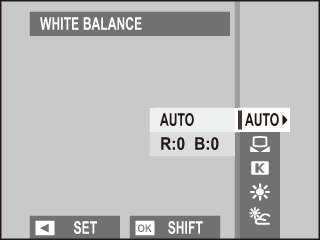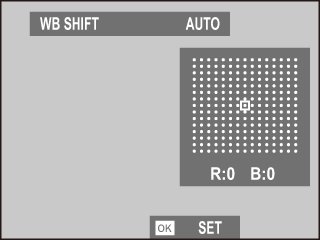 [WHITE BALANCE]
[WHITE BALANCE]For natural colors, choose a white balance option that matches the light source.
Select [WHITE BALANCE] in the shooting menu.

Press the selector up or down to highlight the desired option and press [MENU/OK] to select.
Press [MENU/OK]. The dialog shown below will be displayed; use the selector to fine-tune white balance and press [MENU/OK] to select, or press [DISP/BACK] to exit without fine-tuning.

White balance is adjusted for flash lighting only in [AUTO] and  modes. Turn the flash off using other white balance options.
modes. Turn the flash off using other white balance options.
Choose  to adjust white balance for unusual lighting conditions. White balance measurement options will be displayed; frame a white object so that it fills the display and press the shutter button all the way down to measure white balance (to select the most recent custom value and exit without measuring white balance, press [DISP/BACK], or press [MENU/OK] to select the most recent value and display the fine-tuning dialog).
to adjust white balance for unusual lighting conditions. White balance measurement options will be displayed; frame a white object so that it fills the display and press the shutter button all the way down to measure white balance (to select the most recent custom value and exit without measuring white balance, press [DISP/BACK], or press [MENU/OK] to select the most recent value and display the fine-tuning dialog).
Color temperature is an objective measure of the color of a light source, expressed in Kelvin (K). Light sources with a color temperature close to that of direct sunlight appear white; light sources with a lower color temperature have a yellow or red cast, while those with a higher color temperature are tinged with blue. You can match color temperature to the light source as shown in the following table, or choose options that differ sharply from the color of the light source to make pictures “warmer” or “colder”.
Choose for redder light sources or “colder” pictures
Choose for bluer light sources or “warmer” pictures

2,000 K
Candlelight
5,000 K
Direct sunlight
15,000 K
Blue sky
Sunset/sunrise
Shade